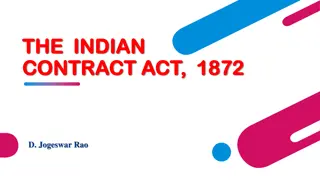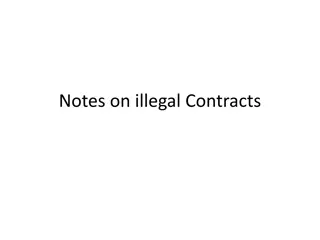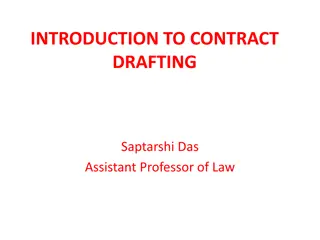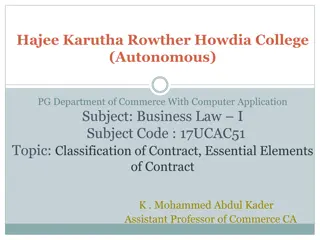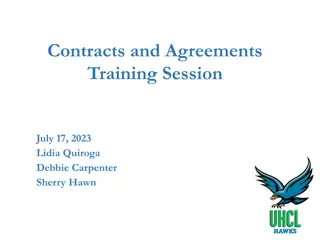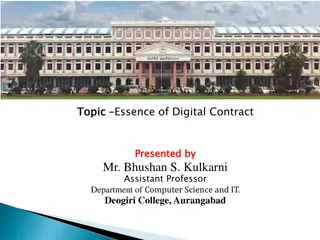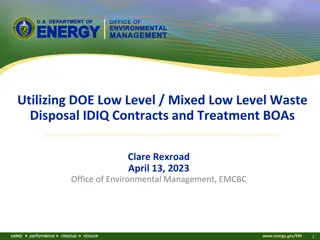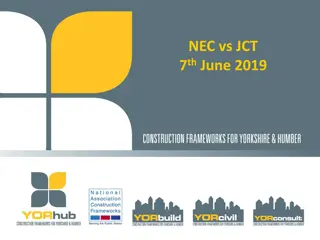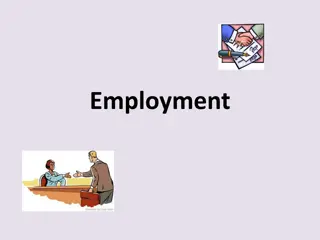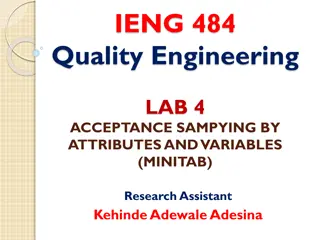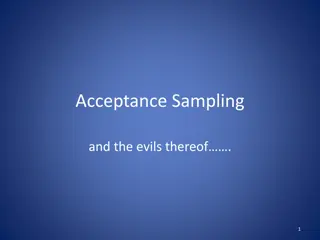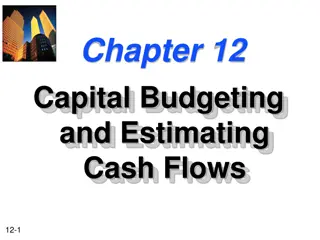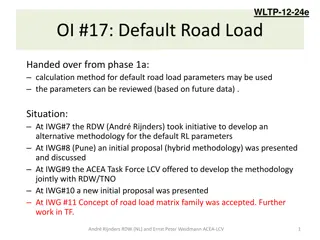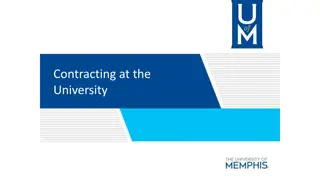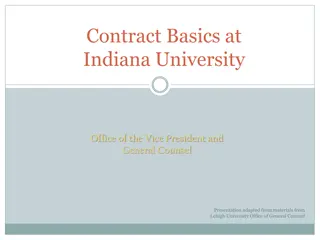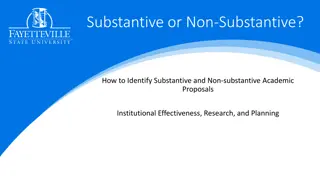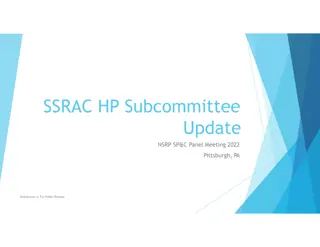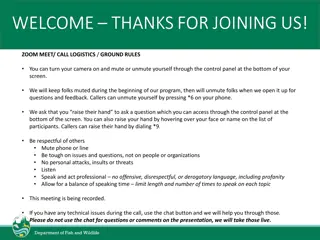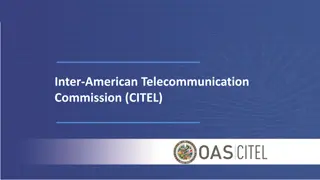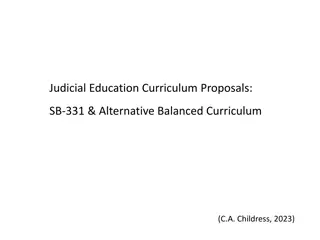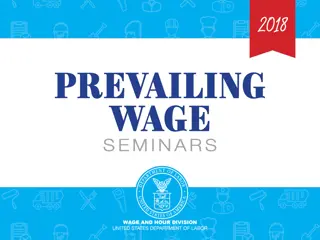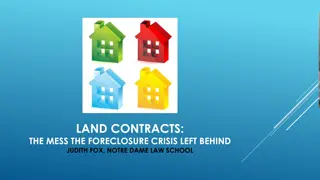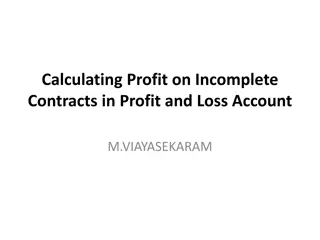Understanding Proposals, Offers, and Acceptance in Contracts
In Chapter 2, we delve into the essence of proposals and acceptance in legal agreements. A proposal signifies one's willingness to act or refrain from acting to secure another's agreement. Legal rules surrounding offers are discussed, along with various kinds of offers like general offers, specific offers, and counter offers. The chapter also touches on the modes of offer revocation and counter offers affecting the original offer validity.
Download Presentation

Please find below an Image/Link to download the presentation.
The content on the website is provided AS IS for your information and personal use only. It may not be sold, licensed, or shared on other websites without obtaining consent from the author. Download presentation by click this link. If you encounter any issues during the download, it is possible that the publisher has removed the file from their server.
E N D
Presentation Transcript
PROPOSAL AND ACCEPTANCE CHAPTER 2
S.2(a) Proposal When one person signifies to another his willingness to do or abstain from doing anything, with a view to obtaining the assent of that other to such act or abstinence, he is said to make a proposal The person making an offer is known as offeror, proposer or promisor Examples- Specific and general
LEGAL RULES REGARDING OFFER 1. Intention to create a legal relation 2. Certain or Unambiguous- e.g. A offers to sell 10 litres of oil to B it is very ambiguous. Instead, the offer should be A offers to sell 10 litres of coconut oil @RS 200 per litre 3. Mere Declaration of Intention e.g. I tell my friend I think I should dispose off my car is not a valid offer but only a declaration of intention 4. Communication Lalman Shukla v. Gauri Dutt 5.Different from Invitation to offer- e.g. Menu cards, catalogue of prices, price tags are all invitation to offer 6. Special Terms - e.g. mutual funds
KINDS OF OFFER 1. General offer- offer made to public at large 2. Specific offer- to a specific person or a specific group 3. Cross offer- e.g. A offers to sell his Dell laptop to B and B offers to sell his HP laptop to A 4. Counter offer- when the offeree accepts the offer not per se , but with some modifications he is said to make a counter offer e.g. A offers to sell his farm to B for Rs. 20 Lakhs and B is willing to purchase the same at Rs. 15 lakhs. An offer by B to A is a counter offer 5. Standing offer- continuing offer- valid for a continuous period of time
MODES OF REVOCATION OF AN OFFER ( to take back, withdraw) 1. By notice of revocation Auction 2. By death or insanity of offerer or offeree 3. Lapse of time for e.g. sale at Big Bazaar up to 31st July . Not valid after that 4. Not accepted in the prescribed mode for e.g. A offers to sell his laptop to B and says that B needs to Email in case of acceptance. Here, prescribed mode is email 5. By failure to accept condition precedent a condition that needs to be satisfied by the offeree e.g. A offers to sell his bike to B only when he pays an advance of Rs, 5000/- This is a condition precedent
6. Counter Offer when there is a counter offer made by the offeree the original offer stands to be revoked . For e.g. A offers to sell his farm to B for Rs. 20 lakhs. B offers to purchase that farm at 15 lakhs. In the above e.g. Offer by B is a counter offer and the original offer by A stands to be revoked 7. Rejecting an offer 8. Subsequent illegality or destruction of the subject matter- A offers to sell his mobile to B at Rs 30,000 next week. The next day A s mobile is lost. Here the subject matter is destroyed. So offer is revoked.
ACCEPTANCE S.2(b) when a person to whom the proposal is made signifies his assent thereto, the proposal is said to be accepted. A proposal when accepted becomes a promise . Legal rules related to acceptance 1. Who can accept acceptance can be only by the person to whom the offer has been made 2. Absolute and unconditional 3. Mode of acceptance 4. Communication (Mrs. Carlill v/s Carbolic smoke ball co. (1893) 5. Mental acceptance is no acceptance 6. Time limit 7. Before the offer lapses 8. No acceptance without the knowledge of the offer
COMMUNICATION OF OFFER AND ACCEPTANCE COMPLETION OF COMMUNICATION OF OFFER The communication of a proposal is complete only when it comes to the knowledge of the person to whom it is made. E.g. A offers to sell his farm to B for Rs. 30 lakhs. The letter of this offer is posted on 9thJuly, 2021. The letter is received by B on 11 July, 2021 and he reads it. The offer is communicated and completed only on the 11July, 2021
Completion of communication of acceptance Law is a little complex as regards completion of communication of acceptance The timings are different for the offeror and offeree The communication of acceptance is complete for the offeror, the moment acceptance is dispatched. Whereas for the offeree, it would be complete only when the offeror receives it. A offers by letter to sell his house to B for Rs 1 crore by a letter dated 10thJuly, 2021. The letter reaches B on 12thJuly, 2021. B accepts the offer by a letter posted on 13thJuly, 2021, which reaches A on 15th July, 2021. For the offeror (A) communication of acceptance is completed on 13thJuly, 2021 For the offeree (B) communication of acceptance is complete on 15 th July, 2021
THANK YOU


